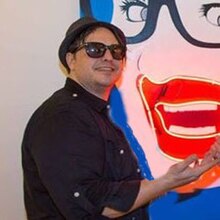Daniel Genis
| Daniel Genis | |
|---|---|

Daniel Genis in Manhattan, 2015
|
|
| Born |
August 2, 1978 New York City |
| Occupation | Journalist, writer, media personality |
| Nationality |
|
| Ethnicity | Russian-Jewish |
| Citizenship | American |
| Period | 2003-present |
| Genre | Non-fiction |
| Subject | Marginality |
| Spouse | Petra Szabo (m. 2003) |
| Relatives | Alexander Genis (father) |
| Website | |
| www |
|
Daniel Genis (born August 2, 1978) is a Russian-American journalist and writer.
Daniel Genis was born in New York City to Alexander and Irina Genis only a few months after their emigration from the Soviet Union, in 1977. He grew up in Washington Heights, Manhattan, NY.
His father, Alexander Genis is a Russian writer, broadcaster, and cultural critic, and Genis' parents' apartment during the 80s and 90s doubled as a clubhouse for Russian writers and artists. Genis was exposed to literature and the arts from a young age, mixing with artists and intellectuals, including Russian ballet dancer Mikhail Baryshnikov, Umberto Eco, Norman Mailer, Joseph Brodsky, and Czech film director Milos Forman.
The living room of his childhood home was where Daniel's father and his collaborators edited Семь дней (Seven Days) (a weekly literary supplement to Новое Русское Слово) for a short time, but they achieved almost star status as the chief literary critics of the weekly newspaper Новый Американец. Alexander Genis, Peter Vail, Sergei Dovlatov and Vagrich Bakhchanyan collaborated on a weekly emigre magazine which was later considered a hallmark of the early 80s because of its early publications of Eduard Limonov, Vladimir Sorokin, Victor Pelevin and Andrei Sinyavsky.
Genis graduated from Stuyvesant High School (where he was a student of Frank McCourt) in 1996, along with classmates such as Harry Siegel, Jessica Valenti, and Kelly Karbacz. He continued his education at New York University, graduating with a bachelor's degree in History and French in 1999. Genis also spent one year studying at the University of Copenhagen in 1999. Genis obtained an interest during this time in antiquarian bookshops and specifically, eighteenth and nineteenth century editions of Greek and Roman classic literature.
...
Wikipedia
